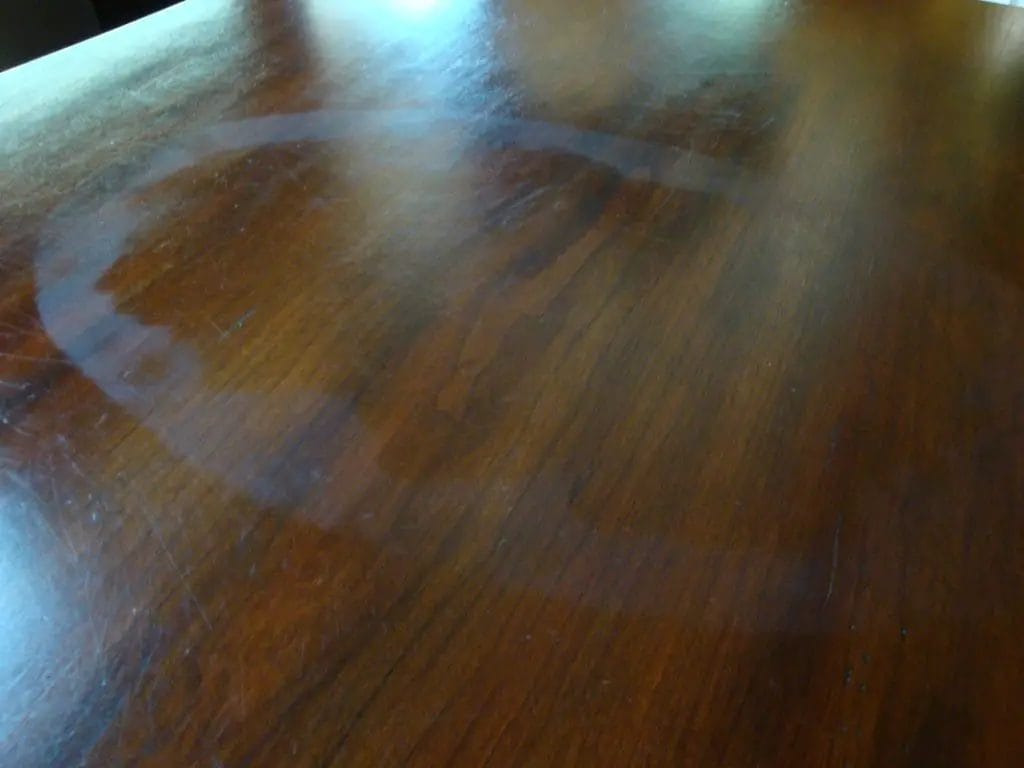Have you ever spilled something sticky on your beautiful hardwood floors and wondered if a quick clean with rubbing alcohol would do the trick? While rubbing alcohol is a powerful disinfectant and can tackle many household messes, it’s not always the best choice for your wood floors. This article will explore the pros and cons of using rubbing alcohol on wood, provide tips for safer cleaning methods, and guide you toward the best practices to keep your floors sparkling clean and free from damage.

Image: www.reddit.com
Wood floors are a timeless and elegant addition to any home, but they require careful maintenance to preserve their beauty and longevity. Understanding how to clean them effectively without compromising their integrity is crucial. With the right knowledge, you can confidently address spills and maintain your wood floors for years to come.
The Pros and Cons of Using Rubbing Alcohol
Rubbing alcohol, also known as isopropyl alcohol, is a versatile cleaning agent, but its effectiveness on wood floors is a matter of debate. Here’s a breakdown of the potential benefits and drawbacks:
Pros:
- Disinfection: Rubbing alcohol is an effective disinfectant that eliminates bacteria, viruses, and mold. This can be beneficial for cleaning spills from food or other potentially harmful substances.
- Fast Drying: Rubbing alcohol evaporates quickly, leaving little to no residue behind. This can be desirable for avoiding streaks or smudges.
- Cost-Effective: Rubbing alcohol is readily available and relatively inexpensive compared to specialized wood floor cleaners.
Cons:
- Stripping Finishes: Rubbing alcohol can strip the finish off some wood floors, particularly those with delicate coatings like polyurethane or wax. This can leave the wood vulnerable to scratches, stains, and damage.
- Drying Wood: Excessive use of rubbing alcohol can dry out wood, making it more susceptible to cracking and warping. This is especially true for older or unsealed floors.
- Odor: Rubbing alcohol has a strong odor that may linger in the air for some time, particularly in enclosed spaces.

Image: toolsvoice.com
When to Use Rubbing Alcohol With Caution:
While rubbing alcohol can be used cautiously on some wood floors, it’s generally not recommended for the following scenarios:
- Newly Finished Floors: Avoid applying rubbing alcohol to freshly finished floors. The alcohol can damage the protective layers, making the finish uneven or dull.
- Delicate Finishes: Be extra cautious with delicate finishes such as hand-rubbed oil finishes or wax-based polishes. These finishes are more susceptible to stripping with rubbing alcohol.
- Unfinished Floors: Rubbing alcohol should never be applied to unfinished wood floors. It can penetrate the wood, causing discoloration, warping, and other damage.
Safe Alternatives for Cleaning Wood Floors
Fortunately, there are many safer and more effective alternatives to using rubbing alcohol on wood floors. These methods will help you keep your floors clean and protected without compromising their integrity.
1. Cleaning Solutions Specifically Designed for Wood Floors:
The best option for cleaning wood floors is to use specialized cleaning solutions designed for this purpose. These solutions are carefully formulated to be gentle on wood finishes while effectively removing dirt, grime, and stains. Look for solutions that are pH-neutral and free from harsh chemicals, ammonia, and bleach. There are a variety of options available for different types of finishes, so choose the product that matches the finish on your wood floors.
2. Simple Solutions:
For a mild and effective cleaning solution, mix a small amount of mild dish soap, such as Dawn dish soap, in warm water. Apply this solution using a soft cloth or microfiber mop. Rinse the floor thoroughly with clean water and dry it immediately to prevent streaks or watermarks.
3. White Vinegar:
White vinegar is a natural cleaning agent that can effectively clean wood floors. Mix a solution of equal parts white vinegar and water and apply it to the floor using a soft cloth or microfiber mop. Remember to rinse the floor thoroughly with clean water and dry it completely. Avoid using vinegar on floors with delicate finishes or unfinished wood.
4. Essential Oils:
For a natural and fragrant solution, add a few drops of essential oils, like tea tree oil or lemon oil, to a spray bottle filled with water. This combination provides a gentle clean while adding a pleasant scent.
Tips for Maintaining Wood Floors:
Here are some helpful tips for maintaining the beauty and longevity of your wood floors:
- Regular Dusting and Vacuuming: Regular dusting and vacuuming help remove loose dirt and debris that can scratch or damage the floor finish.
- Clean Up Spills Immediately: Address spills promptly to prevent staining. Use a soft cloth or sponge to blot up the spill, working from the outside inward to avoid spreading it further.
- Use a High-Quality Mop: For wet cleaning, use a high-quality mop that distributes cleaning solution evenly and doesn’t leave streaks.
- Avoid Harsh Chemicals: Avoid using harsh chemicals, ammonia, bleach, or abrasive cleaners on your wood floors. These products can damage the finish and leave behind streaks or residue.
- Use Protective Mats: Place protective mats under furniture and in high-traffic areas to shield the floor from scratches and dents.
- Consider a Floor Protector: A floor protector or sealer can help create a barrier against stains, scratches, and wear and tear.
Can You Use Rubdomain_7 Alcohol On Wood Floors
Conclusion:
While rubbing alcohol can be tempting for a quick clean, it’s not the best option for your wood floors. The potential risks of stripping the finish, drying out the wood, and leaving an unpleasant odor outweigh the benefits. You can effectively maintain your hardwood floors by using specialized cleaning solutions, mild cleaning agents like dish soap or white vinegar, and following these essential cleaning and maintenance practices. Remember to always test any cleaning products on a small, inconspicuous area first to ensure compatibility with your floor finish. By following these tips, you can keep your wood floors looking their best for years to come.





